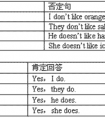句型转换。1. He often helps me with my English. (改为同义句)He often helps me _______ _______ English. 2. Where are you from? (改为同义句)Where _______ you -七年级英语
题文
| 句型转换。 |
| 1. He often helps me with my English. (改为同义句) He often helps me _______ _______ English. 2. Where are you from? (改为同义句) Where _______ you _______ from? 3. The girl has to read English every day. (对画线部分提问) _______ does the girl _______ to do every day? 4. You can run in the hallways. (用outside改为选择疑问句) _______ you run in the hallways _______ outside? 5. Mary gets up at six o'clock every morning. (改为否定句) Mary _______ _______ up at six o'clock every morning. |
答案
| 1. to study 2. do; come 3. What; have 4. Can; or 5. doesn't get |
据专家权威分析,试题“句型转换。1. He often helps me with my English. (改为同义句..”主要考查你对 不定式,疑问代词,助动词的单数第三人称形式,助动词,选择疑问句 等考点的理解。关于这些考点的“档案”如下:
不定式疑问代词助动词的单数第三人称形式助动词选择疑问句
考点名称:不定式
- 动词不定式:
指由to加上动词原形(而且只能是动词原形)所构成的一种非限定性动词,但在有些情况下to可以省略。
动词不定式在语法功能上可作主语、宾语、宾语补足语、表语、定语和状语。 - 动词不定式可以作以上各种成分,但它毕竟是动词,所以有动词的属性。
动词不定式及其短语还可以有自己的宾语、状语,虽然动词不定式在语法上没有表面上的直接主语,但它表达的意义是动作,这一动作一定由使动者发出。
这一使动者我们称之为逻辑主语,其形式如下:
时态 主动形式 被动形式 一般式 (not) to do (not) to be done 完成式 (not) to have done (not) to have been done 进行式 (not) to be doing 完成进行式 (not) to have been doing - 不定式的用法:
1、不定式作主语
例如:To remember this is very important.
注意:为了避免头重脚轻,在许多情况下,通常都将作主语的不定式置于句子后部,而在句首主语位置使用形式主语it。
例如:It is very important to remember this.
2、不定式作表语
例如:He seems to be ill.
注意:不定式作表语主要有三种情况,一是用于seem, appear, prove等系动词之后的不 定式(尤其是to be),
二是像My job is to sweep the floor. 这样的主语与表语“等价”的情形,
三是表示想法、约定、义务、命令、可能性、命运等,如:
You are to come when I call.
3、不定式作宾语
例如:I can not afford to buy a car.
注意:
①不定式不仅用作动词的宾语,还可用作个别介词(but, except)的宾语。
例如:I had no choice but to wait.
②当作宾语的不定式后跟有宾语补足语时,通常要用形式宾语it代替不定式,并将真正的宾语不定式置于宾语补足语之后
例如:I find it difficult to learn Japanese well.
4、不定式作宾语补足语
例如:Who taught you to drive?
5、不定式作定语
例如:I have a question to ask you.
注意:有的名词(如way, chance, right等)后用作不定式可换成of doing sth.
如:It is the best way to do (of doing) it.
但是以下名词后接不定式作定语时通常不能换成of doing sth.
attempt courage decision effort fortune failure invitation wish
6、不定式作状语
例如:I went to France to learn French.
考点名称:疑问代词
疑问代词:
疑问代词在句中起名词的作用,用来构成疑问句。常用的疑问代词有:
what, who, whose, whom, which, whatever, whichever, whoever, whomever
疑问代词在句中应位于谓语动词之前,没有词性和数的变化,除who之外也没有格的变化。
what, which, whose还可作限定词。
Whose books are these on the desk?
桌上的书是谁的?
What was the directional flow of U. S. territorial expansion?
美国的领土扩张是朝哪个方向的?
What events led to most of the east of the Mississippi River becoming part of the United States?
哪些事件使密西西比河以东的大部分土地归属于美国?
疑问代词在句中起名词词组的作用,用来构成疑问句。疑问代词有下列几个:
指 人: who, whom, whose
指 物: what
既可指人又可指物: which疑问代词说明:
一、无论是做疑问代词还是限定词,which 和 what 所指的范围不同。what所指的范围是无限的,而which则指在一定的范围内,例如:
Which girls do you like best?
你喜欢哪几个姑娘?
What girls do you like best?
你喜欢什么样的姑娘?二、Whom是who的宾格,在书面语中,它作动词宾语或介词宾语,在口语中作宾语时,可用who代替,但在介词后只能用whom, 例如:
Who(m) did you meet on the street?
你在街上遇到了谁?(作动词宾语)
Who(m) are you taking the book to?
你要把这书带给谁?(作介词宾语,置句首)
To whom did you speak on the campus?
你在校园里和谁讲话了?(作介词宾语,置介词 后,不能用who取代。)三、疑问代词用于对介词宾语提问时,过去的文体中介词和疑问代词通常一起放在句首,现代英语中,疑问代词在句首,介词在句未,例如:
For what do most people live and work?大部分人生活和工作的目的是什么?(旧文体)
What are you looking for?你在找什么?(现代英语)四、疑问代词还可引导名词性从句,例如:
I can't make out what he is driving at.
我不知道他用意何在。
Can you tell me whose is the blue shirt on the bed?
你能告诉我床上的蓝衬衣是谁的吗?
Much of what you say I agree with, but I cannot go all the way with you.
你说的我大部分同意,但并不完全赞同。- 疑问代词用法:
1. 疑问代词有who, whom, whose, which和what, 都是用来构成疑问句的:
Who is calling? 谁打电话来?
Whom do you want to speak to? 你想找谁接电话?
作主语时用who,作宾语时用whom,在口语中用who作宾语时也不少:
Who did you mean? 你指的是谁?
Who are you talking about? 你们在讲谁?
直接跟在介词后时只能用whom:
With whom did you come? 你和谁一道来的?
(口语中说“Who did you come with?时更多一些。)
2. 其他三个疑问代词可用作:
1)主语:
What’s your address? 你的地址怎样写?
Whose is better? 谁的好一些?
Which of these is yours? 哪一本是你的?
2)宾语:
What do you mean? 你是什么意思?
Which do you like better? 哪一个你更喜欢一些?
Whose have you chosen? 你选了谁的?
- 最新内容
- 相关内容
- 网友推荐
- 图文推荐
| [家长教育] 孩子为什么会和父母感情疏离? (2019-07-14) |
| [教师分享] 给远方姐姐的一封信 (2018-11-07) |
| [教师分享] 伸缩门 (2018-11-07) |
| [教师分享] 回家乡 (2018-11-07) |
| [教师分享] 是风味也是人间 (2018-11-07) |
| [教师分享] 一句格言的启示 (2018-11-07) |
| [教师分享] 无规矩不成方圆 (2018-11-07) |
| [教师分享] 第十届全国教育名家论坛有感(二) (2018-11-07) |
| [教师分享] 贪玩的小狗 (2018-11-07) |
| [教师分享] 未命名文章 (2018-11-07) |


![Sunday is my birthday. I would like _____ a birthday party, would you _____to my party? [ ]A. have; come B. to have; to come C. have; to come D. to have-七年级英语](http://www.00-edu.com/d/file/ks/4/2/budingshi/2020-01-08/smalla85122db0c71d7fb6ae58187be7f1fd11578430330.png)

![Why areyou here? You are supposed ______ in the classroom now. [ ] A. to studyB. to be studiedC. studying D. to be studying -九年级英语](http://www.00-edu.com/d/file/ks/4/2/budingshi/2020-01-08/small6dee02daa62cac1c71853ac804ab4fbd1578422460.png)
![She is very poor. Little food _____ and no room _____! [ ]A. to eat, to live B. to eat, to live in C. eating, living -八年级英语](http://www.00-edu.com/d/file/ks/4/2/budingshi/2020-01-09/small17b77c2697a3ef8f1461d0d14b016ee51578585185.png)
